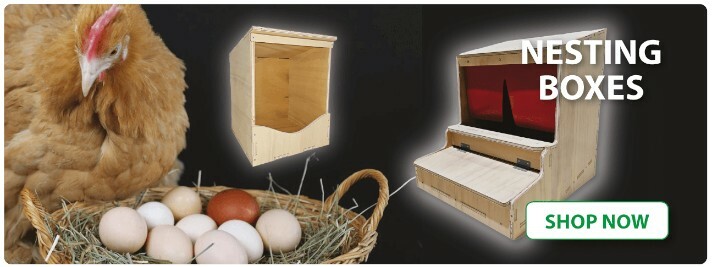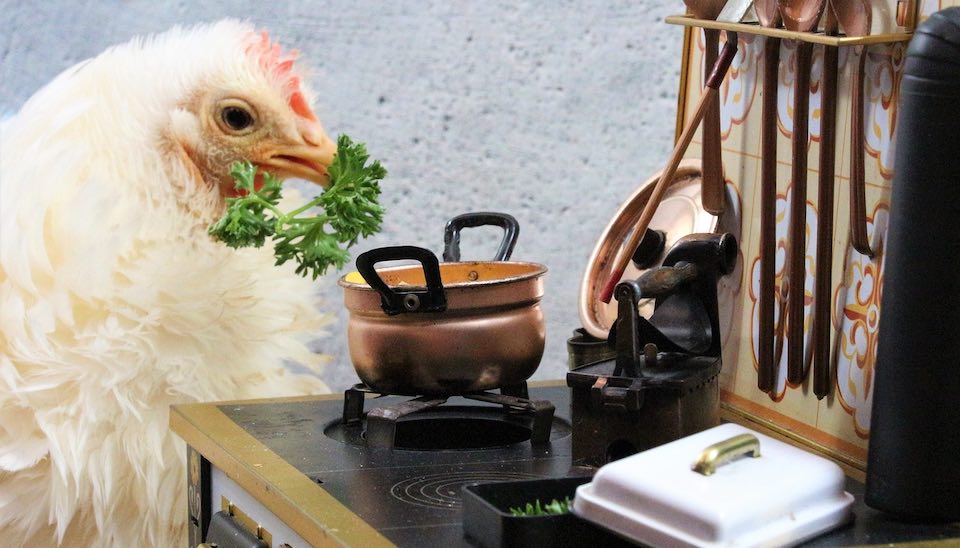Egg Handling and Storage - Best Practice Guide
How to get the most out of fresh chicken eggs
So you have a flock of chickens that lay beautiful, fresh eggs. But everything you do, from how you clean a dirty egg to where you store your eggs, makes a difference to how long your fresh eggs will stay fresh!
Correct handling and storage keeps eggs fresh and safe to eat. If you are hatching eggs, correct storage before incubation is also essential to maintaining fertility. Yet so many chicken keepers don’t know the basics!
We go through how to keep eggs clean, the best egg storage options and all of the most common FAQs, from washing eggs to whether to store eggs in the refrigerator.
1. Dirty eggs and clean eggs
No one likes a dirty egg. But some common egg cleaning methods can actually make eggs less safe to eat!
Do fresh eggs need to be washed before storage?
It is not recommended that you wash fresh eggs, unless they are visibly dirty.
Chicken eggs are covered with a thin layer that is called the bloom. The bloom seals the egg shell, which is porous, and prevents any bacteria or other nasties from entering the egg. Washing the egg will remove the bloom, meaning that bacteria can enter more easily. The temperature of washing water can even push bacteria into the egg!
So keeping eggs clean is the best option. Clean eggs do not need washing, as the natural bloom will prevent contamination and keep the eggs fresh for longer.
Should chicken eggs be washed immediately before use?
Chicken eggs don’t need to be washed before use. Any washing of eggs simply increases the risk of bacteria being drawn in through the shell. Cook with clean eggs and wash your hands after handling egg shells or raw eggs, before continuing with your cooking.
How to clean dirty eggs
The best thing you can do is keep your eggs clean in the first place. We provide some tips on how to do this below.
But even in the cleanest coop, you will occasionally get a dirty egg.
If you get a dirty egg:
- Clean it as soon as possible. The longer there is poop on the shell, the more likely bacteria is to breed and potentially spread into the egg.
- Dry scrubbing is the best way to clean dirty eggs. Use a dry paper towel, scrubbing brush or dry sponge to scrub off any dirt or faeces.
- For really stubborn faeces, try dampening a paper towel with warm water.
- Eggs should only be submerged in water as a last resort. If you really have to wash an egg, use warm water in a sink or container.
Never put eggs under running water, such as a tap. And never clean or rinse eggs with cold water, always use warm. Both running water and cold water can force bacteria through the egg shell, making the eggs less safe to eat.
Even after you have cleaned a dirty egg, you should:
- Keep it separate from the clean eggs
- Store it in the fridge
- Aim to use it immediately or as soon as possible
- Wash your hands after handling the egg
- Cook the egg thoroughly before eating
On commercial farms, eggs that have more dirt or poop than can be removed by dry scrubbing are usually processed for industrial use. Really dirty eggs are considered unsafe and discarded altogether.
How to help your chickens produce the cleanest eggs
Dirty eggs can be caused by many things:
- A big piece of poo stuck to an egg is usually caused when a hen poops in the nesting box.
- Irregular poo marks on eggs are often caused when chickens track a little poo into the nesting box on their feet.
- Poo streaks on an egg are usually caused by a chicken with a dirty bum.
There are a few things that you can do to ensure your chickens produce the cleanest eggs:
- Collect eggs regularly
- Clean nesting boxes and replace nesting material regularly
- Keep the coop clean and dry so that chickens don’t track poop into the nesting boxes on their feet
- Do not let hens sleep or shelter in the nesting boxes
- Feed your chickens a good diet of a complete layer feed and avoid too many scraps and treats
- Treat your chickens for parasites regularly
- Ensure there are enough comfortable nesting boxes for your flock
- Deal with broody hens, don’t just leave them in the nesting boxes!
- Separate setting hens from the rest of the flock
- Keep insects out of the coop
- When a chicken has a dirty bum, separate it from the rest of the flock and seek veterinary advice
Roll-away nesting boxes
Roll-away nesting boxes are designed so that the egg rolls into a protected compartment as soon as it is laid. Not only does this prevent accidental breakage and egg eating, it keeps eggs much cleaner!
Roll-away nesting boxes are particularly good if you aren’t at home to collect eggs throughout the day.
2. Egg storage
Contrary to popular belief, eggs don’t have to be stored in the refrigerator. But there are some benefits to keeping eggs in the fridge.
We go through all of your egg storage FAQs and reveal how to keep your eggs fresh for longer!
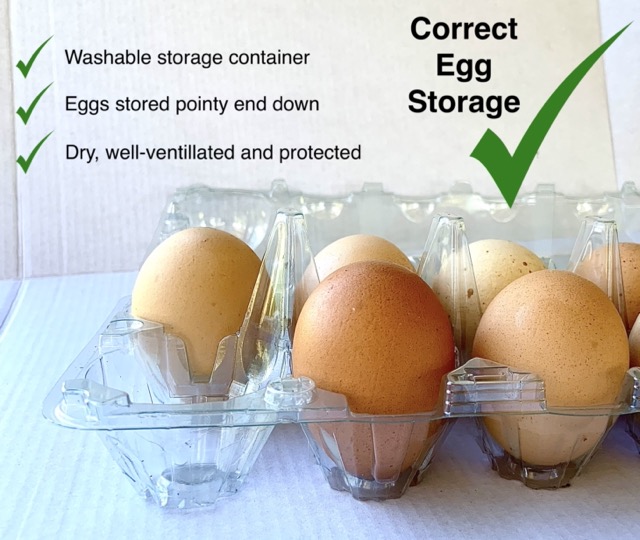
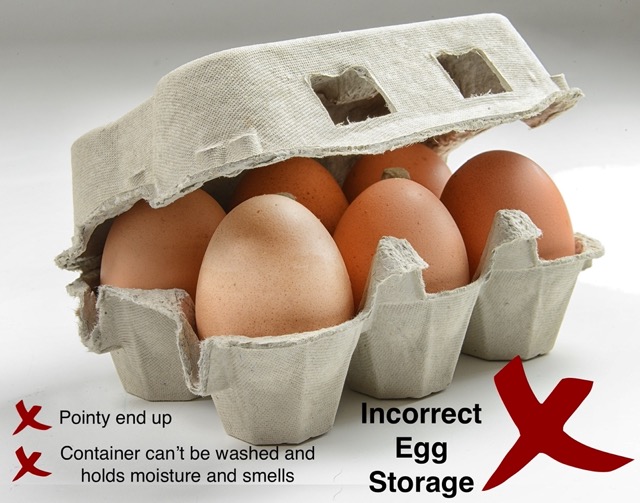
Do eggs need to go in the refrigerator?
Eggs keep much longer in the refrigerator. But fresh eggs don’t need to be refrigerated.
During summer, it is better to refrigerate eggs to keep them cool. But for most of the year, we just keep them on the bench.
If you are not going to eat eggs within a week or so, it is better to refrigerate them. Put them in the fridge after collection, rather than letting them sit on the bench for a few days first.
The exception to this is bought eggs. If you have bought eggs from a store where they were kept in a fridge, you need to refrigerate them at home also.
What is the best temperature to store eggs?
Eggs need a stable temperature for storage. If eggs warm up after being cold, condensation forms on the shell, which can cause mould and contamination.
Heat and low humidity are also bad because they increase evaporation, making eggs go off much more quickly. In a very hot, dry environment, eggs can lose up to 0.1 g of water per day!
The ideal temperature for storing eggs is 2 degrees Celsius with 80 % relative humidity. If you have a root cellar, it might be perfect for storing eggs.
Which way up should eggs go in the carton?
It is counter-intuitive, but eggs should always be stored pointy-end down. This is the opposite of almost all of the egg photos you see!
The pointy-end of the egg is the strongest and having the blunt end, where the air chamber is, facing up helps to regulate evaporation.
Where to store eggs
It is fine to store eggs on the kitchen bench. If we are storing eggs on the bench, we use this handy wire rack which helps us keep track of which eggs should be used first.
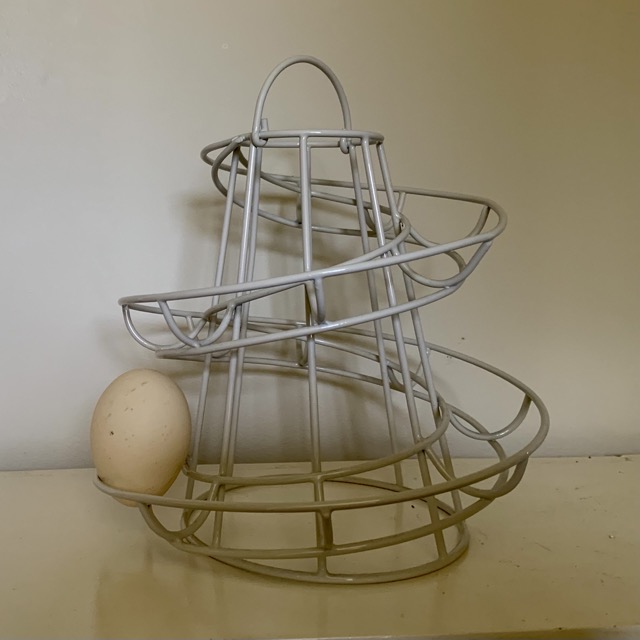
But if you wish to store eggs for a longer period, they should be kept somewhere cool with a stable temperature. While high humidity is ideal, it is less important than temperature for keeping eggs fresh.
In most homes, a refrigerator is the best place to store eggs, although cellars and pantries may also be suitable. Keeping eggs in the fridge will more than triple their shelf life!
Store eggs on a shelf, not in the door of the fridge, for a more stable temperature.
In hot or dry climates, eggs are best kept in the fridge or cellar all the time. The same goes where the temperature varies significantly, for example in summer where the house is hot while everyone is out during the day and cooler in the evening when the air-conditioner is on.
Egg storage containers – dos and don’ts
How you store your eggs also makes a difference.
Choose cleanable materials
Because eggshells are porous, it is important to store eggs in clean containers to prevent contamination. Reusing cardboard egg cartons is not recommended for this reason.
Plastic egg cartons and ceramic or plastic egg holders are better options because they can be cleaned. Even this kitschy blue glass number is good because it is so washable!
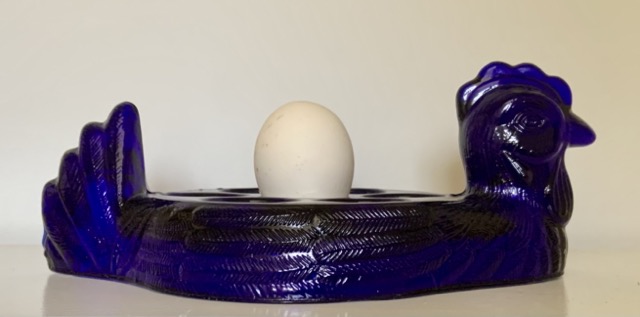
Choose a well-ventilated, dry and protective container
Eggs can absorb smells and flavours from the air, so a protective storage container is important. But eggs also need to breathe, so never use an airtight container like a Tupperware.
Egg containers that are well-ventilated and don’t hold moisture are the best choice.
Use a plastic egg carton or an egg tray in an unsealed plastic box or fridge compartment.
Cardboard egg cartons - do or don't?
Once your friends and colleagues hear that you have chickens, they will give you piles of used egg cartons! Plastic cartons can be washed and reused. But cardboard cartons shouldn't be, even though many chicken keepers do it.
On the one hand, cardboard packaging is a (more) sustainable option than plastic, and recycling is great.
But in reality, used cardboard egg cartons can spread disease to your flock or harbour bacteria that can contaminate eggs. Plus cardboard absorbs smells and moisture, so after the first use it is not the best storage environment for eggs anyway!
Fortunately, there are plenty of other sustainable uses for cardboard egg cartons, so that you don't have to feel guilty for throwing them away and can still accept your friends' egg cartons without a word!
Recycle cardboard egg cartons by:
- Using them as brown material in your compost (ensure they are 100 % cardboard first!)
- Raising seeds in them - they make great seedling containers! Separate the cups and put a hole in the bottom of each one before you plant the seeds. Then you can put the seedling, cup and all, straight into the garden, reducing transplant shock and enriching your soil! Again, be sure the carton is 100 % cardboard!
There are plenty more ideas for recycling cardboard egg cartons online!
3. Egg handling
Always wash your hands after handling eggs, even clean eggs.
Although it is unlikely, there can be salmonella and other harmful bacteria on the shell. This is especially the case where eggs have faeces on them. While the egg will be protected by the bloom, washing your hands protects you and your food.
Do you have an eggy question that we haven't answered? Get in touch!
Happy egg hunting!
Rachael at Dine a Chook Australia



